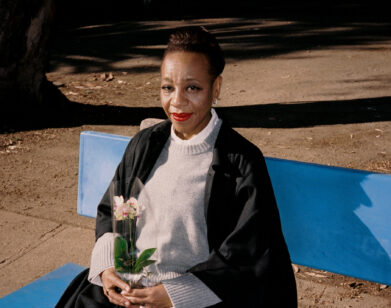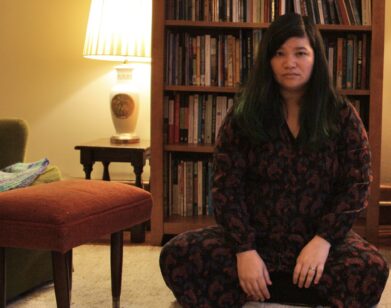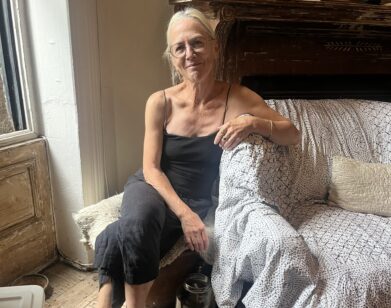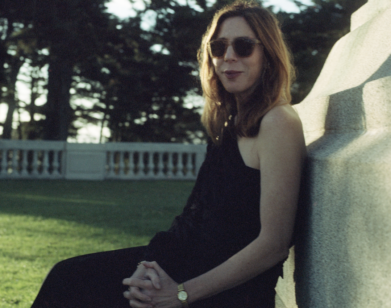IN CONVERSATION
Obsessed With Awards Season? Then Daniel D’Addario’s The Talent Is For You.
What happens when a grand dame, a former child star, an indie darling, a veteran underdog, and an alcoholic ingénue compete for the best actress award? No, I’m not talking about this year’s Oscar race; that’s the premise of The Talent, the debut novel by Daniel D’Addario. “An awards season inherently has a degree of pitched up emotion where it’s almost primal, this desire to be accepted and lauded,” the author says. “You cannot control the way you’re perceived by others, so accepting it is what they all have to do.” On that embattled road to self-acceptance, five women find themselves in a months-long publicity circus that’s equal parts pageantry, puff pieces, and power struggles. It’s a subject that D’Addario, the chief correspondent at Variety, knows unusually well via his day job. But he cleared up one thing with fellow novelist Katie Kitamura, who found herself wondering which real-life performers inspired the ladies of The Talent. “I want to preserve the guessing game,” D’Addario quipped. A week before publication, the two writers got together to talk about thwarting archetypes, mother-daughter relationships, and what really goes down during awards season.—EMMA STOUT
———
KATIE KITAMURA: I feel like I’ve been aware of you and your work for a long time, so it’s nice to get to chat.
DANIEL D’ADDARIO: Thanks for saying that. I’ve certainly been aware of you and your work for a really long time. I thrust A Separation on every new friend who asks for a book recommendation and the work’s only grown deeper and more resonant for me.
KITAMURA: Wow, thank you. The timing of your book’s publication is so perfect because it is a week before the Oscars, right?
D’ADDARIO: Precisely.
KITAMURA: It’s been a very dramatic award season, particularly in the female actress section.
D’ADDARIO: It feels very propitious. I always knew it was planned by my publisher to be for this time of year, but as you say, the best actress race in real life has beggared belief. My book is about five women who are nominated for best actress in an awards season and the rivalries and friendships that develop between them. Without getting too deep into the nuts and bolts of it, it’s a little bit about acceptance of one’s fate because, just as in this award season in real life, where it’s been such a seesaw, things happen almost at random. You cannot control the way you’re perceived by others, so accepting it is what they all have to do.
KITAMURA: You have written about the film industry and Hollywood as a culture from so many different angles. When it came to write about it in the form of a novel, how did you come to the decision to center it on this container of awards season?
D’ADDARIO: Well, in my professional life covering the real awards season, it struck me that it has this natural narrative. The word narrative is actually used a lot: “Oh, what is Demi Moore’s narrative this year?” But there are these waystations that provide a backbone to a real awards season. That lent a structure that would do a lot of work for me. And as a first time novelist, I needed all that support I could get. An awards season inherently has a degree of pitched up emotion where it’s almost primal, this desire to be accepted and lauded. We dress it up in a fancy way, but it gets to real hurts and real desires that we all can relate to on some level. I felt that if I wanted to write about the concept of performing and about what it means to perform and what it means to be judged, then this provided a really elegant shell, almost a crucible in which all of these things were heightened.
KITAMURA: I’m really fascinated by how we as people and also as novelists use narrative as a way of creating meaning and creating and controlling a story in a way. As you said about the real-life awards season, but also in the novel, the narrative that the characters are meant to enact is constantly slipping out of control. Things happen, and they act in ways that are maybe indiscreet or that have been set up for them by their publicist or the studio, by the machine writ large. So I wondered if you could talk a little bit about narrative and control.
D’ADDARIO: Well, I’ll start by saying that I found it somewhat liberating. I love what I do professionally, but it’s very different on a day-to-day basis. Not only am I presented with a set of facts that I can’t embellish or embroider, but if I’m writing a profile of someone, I can sense a narrative creeping in that’s been given to me or predigested and I have to push back against that. But in this, just as you say, I had the freedom to create the reality for these women. What I most wanted and what I think you’re putting your finger on is, I didn’t want it to feel predigested. I didn’t want any of them to end the book feeling as if they were the archetype that they start out as. You could look at each of them and say, “She is this. She is a grand dame. She is always upright and full of rectitude and never puts a foot wrong.” I thought there was a great pleasure in seeing them slip. In Audition, you do this quite beautifully. Your protagonist is a stage actress and I think we understand—from the way she dresses, the way she orders at a restaurant—that she has a certain self-possession, and that self-possession falls away. When you’re an actor, you’re used to saying lines others have written for you. Both your protagonist and my characters find themselves in this precarious position where, when the narrative slips away, they have to actually figure out what lines they want to speak for themselves, which is not an easy thing.
KITAMURA: I wonder if you could share a little bit about these five characters. I mean, you are definitely playing with archetypes, but very quickly you complicate those archetypes. Another thing that I loved about the novel was the way you set it up in the beginning with the introduction of these women—the reader knows only one of them wins, so it has this propulsive quality.
D’ADDARIO: Before there was ever a character, there was a situation germinating. There are famous examples of people who’ve been nominated many times and never won. What does it take to keep going back when it starts to seem that the universe has anointed you the loser? What makes a person want to come back? To me, that would be almost repulsive at a certain point, but perhaps there might also be some grain of hope that this is the time, or some feeling of wanting to get your revenge like Carrie in the Brian De Palma film. So Jenny, the character who has a long history of losing, emerged from that. And if there is someone who is always a loser, there must be someone who is always a winner. They emerged in relation to each other and their traits are reflections of each other. So, knowing that I was working with the number five, I started to think about the way this novel will be structured. In my mind, Bitty, a terribly insecure person who has no confidence in her talents and struggles in the public eye, is a mirror of Contessa, who has supreme confidence and is seeking to bulldoze her way through life as a former child star who sees her future before her as a series of victories to be won. Then Davina, the novel’s wild card, is the fifth nominee, and I wanted there to be a real element of dynamism and change. To me, she’s the character who changes the most. Without giving anything away, she’s someone who’s always been content with her lot in life as a stage actor of limited renown, and the opportunity to engage with the world of celebrity turns her head and alters her expectations for her life. So those were the five, but the novel was initially written in a very different way, as five short stories that were very self-contained. But I rewrote it in order to create more collisions between them.
KITAMURA: I think you capture the isolation of these characters really beautifully, even as you put them all out on the board and we see them inching towards each other, colliding against and then ricocheting apart. There is a true loneliness at the heart of many of these central characters that I found quite profound.
D’ADDARIO: Well, thank you for saying that. I think there are practical reasons why what they’re doing is lonely, and then somewhat loftier ones dwelling in the world of ideas. In my professional life, I’ve seen many people who are very fortunate to be at the pinnacle of their field but whose schedules between October and March of any given awards season are so demanding that they must necessarily spend those six or seven months speaking solely about themselves into microphones. It’s an endeavor that I think they’re lucky to get the chance to do, but is inherently punishing and a bit isolating. Then I think that beyond that, and what’s so amazing and what’s so joyful about film is that it’s a team effort. The director is the leader of this little company and they work together to put something on and then pull out one element of it and say, “Now talk about how wonderful you are.” Putting myself in those shoes, I think it would be really destabilizing. Not to be meta, but I’m speaking to you and I am feeling good and I’m feeling confident. The only thing we’re trying to do is to promote awareness of this book. But it does not end in a televised ceremony where I find out whether I’m the best writer or not. That would be horrible. So I think it’s inherently nerve-wracking and lonely, and one of the hardest parts of it is that each of these women has four peers who are going through the exact same thing, but they are kept apart. When they are able to connect, competition is in the air.
KITAMURA: One of the other implicit key relationships in the novel is between mothers and daughters, and that takes different forms. Sometimes literal mothers and daughters, sometimes symbolic ones. Contessa, for instance, has a very fraught relationship with what you might call her stage mother.
D’ADDARIO: I would say stage mother, absolutely.
KITAMURA: There’s also this generational gap. Adria and Jenny are of an older generation, almost a different version of Hollywood entirely. Bitty and Contessa are very much from a younger generation. I wondered if you could talk a little bit about generational difference, both on the larger scale in terms of what you’re saying about how entertainment and culture has changed over the years, but then also on this very personal level in terms of the characters and their own relationships with motherhood and being a daughter.
D’ADDARIO: There were elements of this that were drawn from simply observing the culture. Both Adria and Jenny feel as though something is being taken from them when they have to sacrifice elements of their privacy or their time, because in the time that they’ve been famous, our culture has shifted in a direction to be ever more all-encompassing all the time. Both of them have the expectation that they will be able to return to their private selves and close a door, whereas someone like Bitty complicates that. She looks at both of them at different times and it’s like that children’s book, Are You My Mother?
KITAMURA: Terrible that I’m laughing, because it’s one of the saddest parts of the novel.
D’ADDARIO: Well, I wanted there to be a laughter through tears element. Without getting too deep into it, I would say that this is not the novel I would’ve written before becoming a parent. When I wrote this, I was a parent of one. I’ve since become a parent of two. Having a child and seeing that she is fundamentally her own person on her own journey, which should be obvious—parenthood has this way of teaching you things that you already knew in a different, more intuitive way. So, to me, the Bitty quest for a wholeness and connection, it did feel very personal because it called to mind my own experience of being a parent. I sent it to my agent and I said something along the lines of, “Surprise! It’s about the Oscars, but it’s also about mothers and daughters.”
KITAMURA: One of the other aspects of the novel that I really loved and which you know very, very intimately is the role of publicity and press and profiles. There are articles and profiles dropped into the book. They seem to me like they’re satirical, and I wonder if you could talk about how you crafted those.
D’ADDARIO: The articles were actually a brilliant suggestion from my editor, who told me that an element that was missing from the novel was a sense of how these women are seen by the world outside the industry. For instance, it’s implied that everyone in the industry knows that Bitty is problematic, or everyone sees Contessa as a bit of a brat in the industry. But to the world, she’s an idol. I think allowing us to see the ways in which they’re seen was really useful. I also intended to air out some of my feelings about the media. My intention was to have those satirical articles read one turn of the dial more amped up than it would be in real life, but not so much so that it would be absurd. Adria, the grand dame, is profiled in a flowery women’s fashion magazine that writes a gushy, puffy profile. Bitty gets the same treatment in a men’s magazine, but it’s puffy in a leering and prurient way that reminds me of men’s magazines five or 10 years ago, when there would be some woman on the cover in a bikini and the author talking about how their interview was like a date.
KITAMURA: They work really, really brilliantly.
D’ADDARIO: Thank you.
KITAMURA: I hope it’s not too meta of a question, but I did wonder, now that you’re the one doing the interviews, how does it feel?
D’ADDARIO: I’m so suffused with empathy for anyone I’ve ever interviewed. To be very clear, I’m comfortable. I’m proud of the book and I’m honored to be talking to you of all people. The stakes are lower for me than they are for people I interview, because I live a very normal life. I am not going to be recognized on the street no matter how well this book does. But it’s just a very interesting phenomenon to speak for publication. I really prefer to organize my thoughts by writing them down, structuring them. “Oh, that sentence should actually go at the end and those three should be cut.” I mean you have experience with this. Is it comfortable for you?
KITAMURA: I am completely the same. I’m a creature of the page. I have many friends who speak not simply in complete sentences, but in whole paragraphs. That’s a delight to listen to, but I’m definitely not that person. There’s a reason why I write.
D’ADDARIO: I think the first scene I wrote in the book was a version of the scene where Bitty is interviewed on camera. I’ve been on the other side of that, so I wanted to implicate myself a bit, just in the sense of my awareness that it’s a bit of a tightrope and the camera’s lens is monitoring. Not that I or any other journalist are looking for mistakes, but any mistake will be transmitted. I think it’s a stomach-churning prospect for anyone.
KITAMURA: In your experience, how much have readers been interpreting this book as a roman à clef or looking for parallels in real-life situations or real-life actors?
D’ADDARIO: It is completely read as a roman à clef.
KITAMURA: To the degree that with each of the characters, people are looking for their correlation?
D’ADDARIO: Precisely. I hate to disappoint people, because inasmuch as there are elements from real life informing it, I want to preserve the guessing game, but also some of them emerged from my mind. I don’t mean that to sound snobbish or high-handed because, of course, I understand the impulse. But I think that my hope for the novel was that by the end of it, a reader is thinking somewhat less about who might be their real-world analog. I have so much career experience covering the entertainment industry, but I don’t claim to know what goes on inside the minds and psyches of real-world figures.
KITAMURA: How did you play with that expectation on the part of the reader?
D’ADDARIO: I’m glad you ask that, because it was an intention of mine. I wanted it to almost dance away from you as you felt you were getting close. To me, one of the things that makes a truly great star is a certain unknowability. One of the things that makes a great novel character is that we do feel as though we know them intimately. So there’s a tension there—how can we still see them as great stars and understand their aura of unknowability even as we are coming to know them so intimately? One way to do that is to have this extra-textual element of me, a celebrity journalist by trade whispering in your ear, “Well, it’s not really like her.” I don’t think it’s the main function of the book, but I’d be kidding myself if I didn’t say it was something I had a lot of fun with.
KITAMURA: I didn’t even get to ask you about all the invented films, which are these lovely little Easter eggs within the narrative. That must have been great fun to write.
D’ADDARIO: Once I had the characters, that was the first element of the novel I did. I wanted these films to feel like they could exist and fulfill some metaphorical function. Contessa is in The Glass Menagerie—hello, the play about a mother and a daughter. Adria is plainly the supporting actor in a film that she’s insistent upon dominating as a lead. There were elements of writing this novel that were very taxing, and that was not one. That was really, truly fun.
KITAMURA: It’s so wonderful. Thank you so much for this conversation.
D’ADDARIO: This has been such an honor. May I ask what city you live in?
KITAMURA: I live in Brooklyn.
D’ADDARIO: For some reason, I thought you were on the West Coast.
KITAMURA: I thought you were on the West Coast.
D’ADDARIO: No, no. I live in Brooklyn.
KITAMURA: Well, we should get a coffee.







